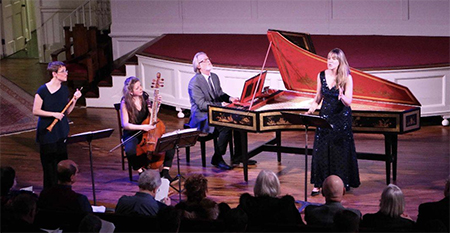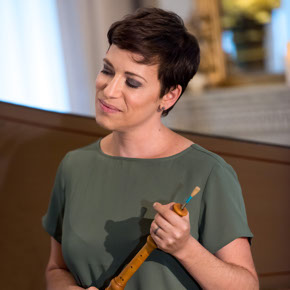by Mike Telin

Cleveland-based period instrument ensemble Les Délices has decided the best path would be to create an all-virtual 2020-2021 season. One series, Embracing Change, will feature four new, 60-minute pre-recorded concerts complete with on-screen titles, program notes, artist interviews, and behind-the-scenes footage. First screenings will include live post-concert Q&A with the artists. Concerts will be available on demand for ten days and audiences can enjoy a closing “Reception” during the final day of each cycle. To view the season and purchase single tickets and subscription packages click here.
In a recent telephone conversation, Artistic Director Debra Nagy said that part of the genesis of Embracing Change was that she had already planned the 2020-21 season back in the fall of 2019. “I continued to tweak and build a budget and then COVID-19 hit in March of 2020.”
Nagy said she spent some time in denial and grieving, but as the weeks progressed, and studies were released about the possible dangers of singing and performing in large groups, she began to ask herself: what does this mean for Les Délices?
“From the beginning I felt that smaller organizations would have the greatest possibility to be versatile. We’re not looking at large audiences in a 2,000-seat hall and we’re not looking at repertoire that requires 30 to 80 people to perform.”
One thing Nagy did know was that spending time developing numerous scenarios for the upcoming season was not in the ensemble’s best interest. “I didn’t want to make four or five contingency plans only to find out that I was going to end up with plan ‘D’ anyway. So I tried to think about how I could design a season that would have the greatest assurance that it could actually happen. How could I keep the artists and audiences safe? We also have another issue, which is people’s perception of safety.”
Embracing Change will feature local artists, with no more than two out-of-town musicians per project and no more than five people per project. “We’re still working out how we can responsibly create a safe work environment,” Nagy said. “And social distancing with our ensemble is not so hard — you just have to give up traditional conceptions of how an ensemble is supposed to be set up.”

Recording sessions are set to begin the middle of August and conclude in the beginning of December. “It does mean that we are recording Christmas carols in October, but that kind of thing has been going on for ages.”
Nagy said she felt a “tremendous amount of relief” once they had decided on a course of action, and one they knew they could pull off. However, this doesn’t mean the season is without risk.
“There is not a lot of precedent in the arts for paying for online content — in classical music people have been giving it away. We’re used to having people show up in person, so a couple that comes to a concert buys two tickets. Now, this couple is sitting on their living room sofa and they may just buy one ticket. Potentially we could have the same number of viewers with half the ticket sales.”
Contributing donations during the concerts will be strongly encouraged given that ticket sales are not a huge part of the revenue stream for classical music. “But that doesn’t mean they’re any less essential,” Nagy said. Another challenge is creating a sense of community around these performances. “That could mean watch parties — a group of four or five that gathers in someone’s living room.”
How have the artists reacted to this strategy? “They’re thrilled that we’re creating something that can actually happen and that the emphasis is on quality. People are starved for collaborative opportunities right now and they deeply appreciate the planning and the care that has gone into that planning.”
While there may be some risks, because the Embracing Change concerts will be available to people worldwide, the potential for audience growth is certainly there. “That is an incredible opportunity,” Nagy said. “Which means a learning curve for us to figure out how to market to those people. It’s never been a better time to try the ‘if you build it, they will come’ mindset.”
On Monday, August 24 at 7:30 pm, Les Délices will launch a second new series, SalonEra, with a program titled “All-Bach” featuring Sherezade Panthaki (soprano), Shelby Yamin (violin), and SalonEra Artists in Residence Eric Milnes (keyboard) and Mélisande Corriveau (viola da gamba and cello).
The twice-monthly, live-streamed, early music-focused variety show hosted by Debra Nagy aims to create a salon experience for the 21st century. The series will bring together regular contributors and special guests for conversation and performance, create an opportunity to increase visibility for emerging artists and artists of color, and provide collaborative opportunities for both individuals and organizations.
A $10 donation per episode is suggested, or for a suggested donation of $75 you can subscribe to the series. Click here for more details. The donations compensate the participating artists, whose livelihoods have been dramatically affected by the COVID-19 pandemic.
Published on ClevelandClassical.com July 1, 2020.
Click here for a printable copy of this article




